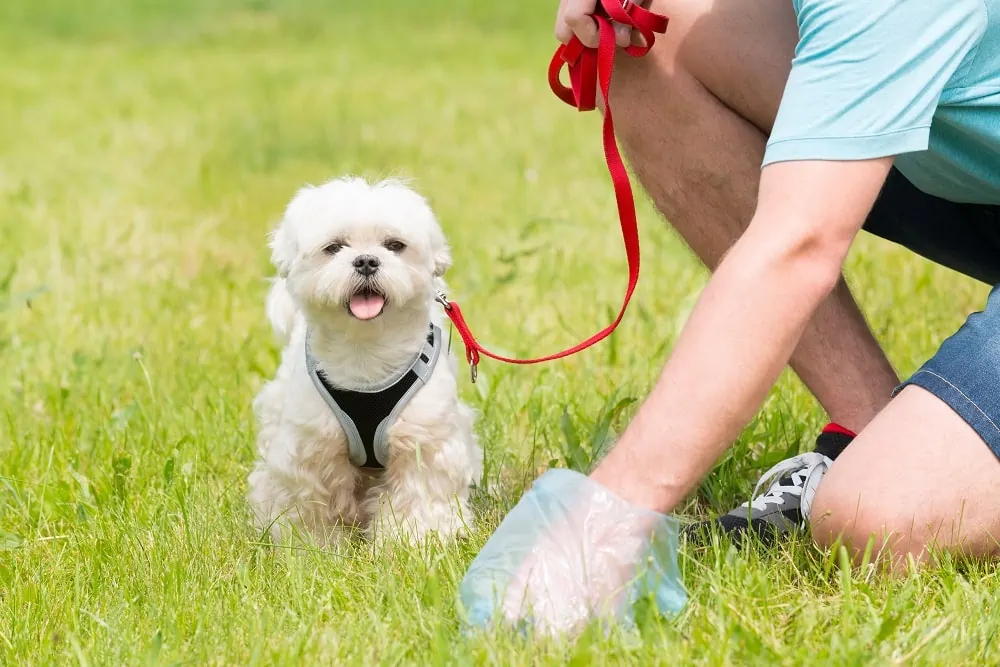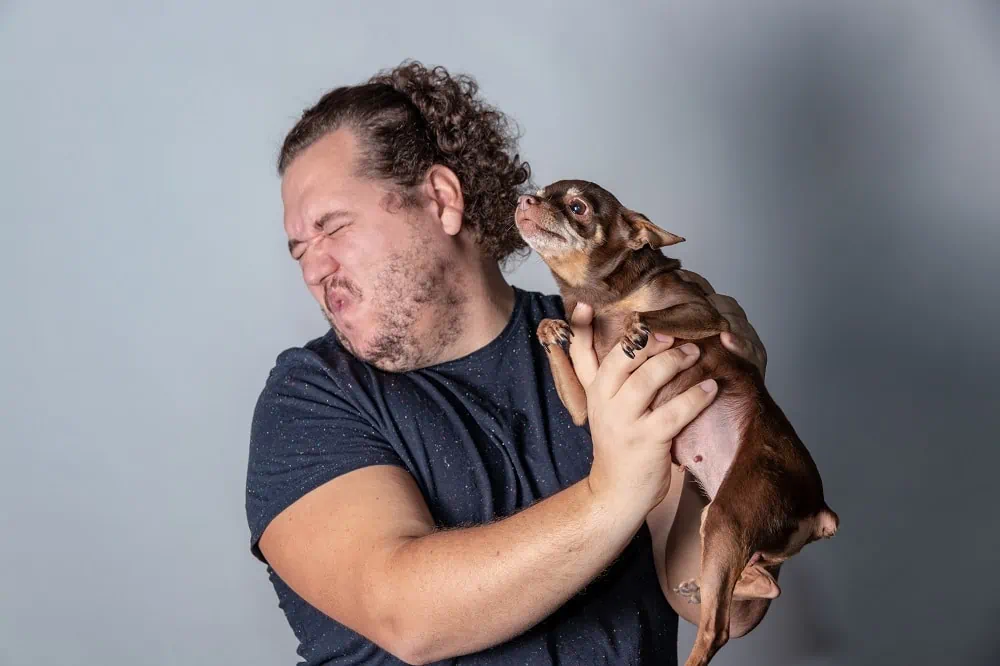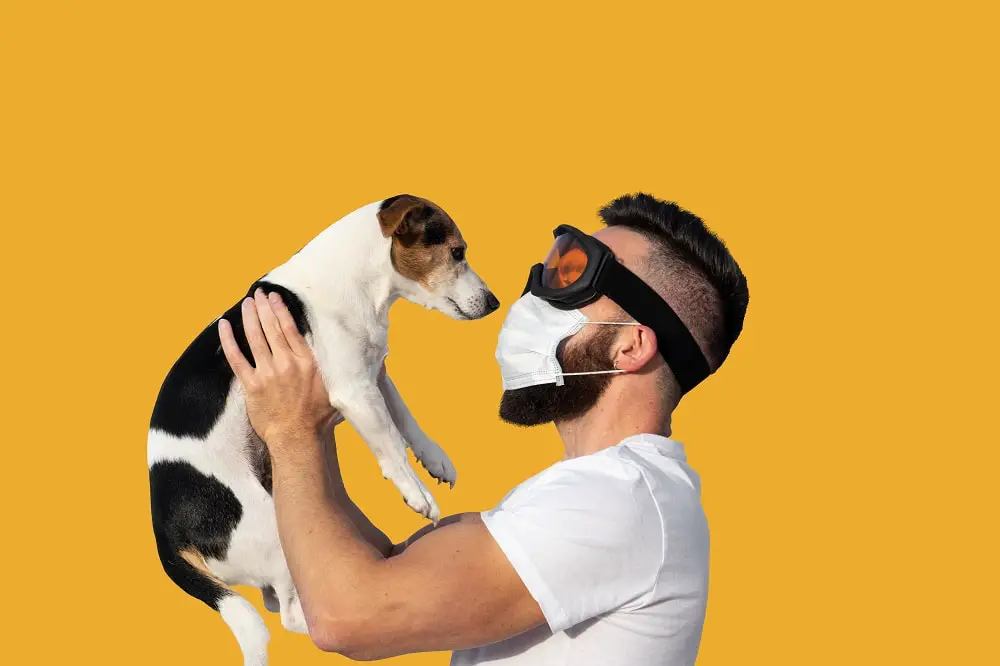There are many joys to sharing your life with a dog, but cleaning up his poop is not one of them! However, life with a dog, especially a puppy, inevitably includes the occasional accident on your carpet – not to mention the never-ending task of removing his poop from your yard.
Still, removing the smell of dog poop from your carpet or lawn is essential to your health and your dog’s, and it also offers a great opportunity to learn about his health.
How do I get rid of the smell of dog poop? Getting rid of the smell of dog poop is as simple as removing the source of the smell – the poop – by cleaning thoroughly. This means removing the poop you can see, as well as breaking down the microscopic particles you can’t see, using an enzymatic cleaner. Cleaning is only the first step, though: you’ll also need to address any underlying health or training problems in your dog as well.
Picking up poop is a few people’s ideas of an amusing task, but what can be even more unpleasant is the smell that lingers behind.
How do I Deal With the Smell of Dog Poop?

A little smell is an inevitable part of sharing your life with a dog – after all, your average dog can’t flush his waste down the toilet the way you can. But no one wants to live with a perpetual stink. Removing the odors from your environment takes a little work, though, so get those rubber gloves ready!
Dealing With Dog Poop Inside the House
Inside the house is probably the worst place you can think of for your dog to leave you a smelly gift, particularly if your house is carpeted. Thorough cleaning is extremely important, not only for your comfort but to ensure the accident isn’t repeated.
Removing the stain and the smell is only the first step, though. It’s important to react correctly when your dog poops where he’s not supposed to, in order to avoid causing a potty hang-up that could lead to future messes.
It’s also vital to check for signs of illness in your dog: if it’s uncharacteristic of him to poop inside, that could be a sign that something is not right.
First things first: how do I clean up?
The first thing on your mind is probably to get that poop off your carpet as quickly as possible, and you’re not wrong! Acting fast means the stain and the smell are less likely to settle in and stick around.
Unfortunately, this means getting up close.
Make sure your dog is outside and no one else comes into the room, to reduce the likelihood of spreading poop around. Find some rubber gloves to avoid transmitting any parasites or pathogens that might be in the poop to yourself.
Solid poop is pretty easy to pick up. Runny poop is a different story, but you’ll still have to wipe up as much as you can using a kitchen towel.
Tie up the poop and any dirty kitchen towel in a plastic bag and throw it straight in the trash – don’t leave it in your kitchen bin as the smell will linger and attract flies.
Next, clean the floor under and around the accident zone with an appropriate cleaning agent. Avoid strong ammonia-based detergents, as these may actually encourage your dog to use the same spot as a toilet again.
Ammonia is a particularly bad choice for urine stains: to learn more about how to deal with urine, read How to Get Rid of Dog Urine Smell from Carpeting.
Instead, invest in an enzymatic odor remover: these are commonly available in pet stores and can also be found in supermarkets. If you don’t have one, you’ll find numerous home remedies online, including baking soda.
However, avoid vinegar as it will cause the same problem as ammonia. Remember that strong odors may be resistant to home remedies and require a more industrial approach.
Removing dog poop smell from carpets
Follow the steps above, scrubbing the carpet thoroughly with cold water and a (non-ammonia based) carpet cleaner to remove the poop.
Don’t steam-clean carpets or upholstery, as the heat will ‘set’ the stain and the smell (source). In a worst-case scenario, if the smell does not fade despite all your efforts, consider renting a carpet cleaner to do a thorough job, or hiring a professional cleaning company.
Removing dog poop smell from hardwood floors
Follow the steps above, cleaning the floor thoroughly with a (non-ammonia based) all-purpose surface cleaner.
Solid poop should be fairly easy to clean up, but if your dog has had a runny accident, it may soak into the cracks between floorboards or the wood itself. In extreme cases, it may be necessary to strip, sand and re-varnish the floor.
Why is it so important to remove the smell?
You may not have realized it from the landmines scattered around your lawn, but dogs tend to return over and over to a particular spot in which to poop.
Your dog’s choice of potty area is based on what he considers ‘home’ territory. He will usually poop as far away as possible from where he sleeps and eats: this is why owners may be horrified to find poop hidden behind furniture or in less-used corners.
Once your dog has pooped in a particular spot to poop, his excellent sense of smell will tell him that that is his toilet area – even if you think you’ve removed all the smelly stuff.
There’s a chance he’ll continue to poop in the same spot. Thoroughly removing the smell will discourage him from making your living room his toilet and save you a lot of future trouble (source).
Why did my dog poop inside?
There are many possible reasons for your dog’s accident: some of them are pretty predictable, and some of them can signal more serious trouble.
If your pooch is a young puppy and not fully house-trained, you shouldn’t be too surprised if he poops in the house at least once.
He hasn’t yet learned that you’d prefer him to relieve himself outside; and even if he has, he probably doesn’t yet know how to ask you to let him out to do his business.
Old dogs, like old people, may develop incontinence and become less able to control when and where they go. If your dog is incontinent, he’s fairly likely to make the odd mess inside despite knowing that he should be going outside. This can cause him distress and embarrassment as well as being an annoyance for you.
You may be thinking, but my dog is young and healthy, and fully house-trained! Even healthy adult dogs may have the odd accident.
It’s possible you’ve forgotten to take him outside or open a door for him, or perhaps he has diarrhea due to eating something that didn’t agree with him. The accident should be a once-off, but be aware that it could signal a health problem.
Should I punish my dog for pooping inside?
We’ve said that your first instinct is probably to clean up the poop as quickly as possible – but this may not be entirely true.
Your first response might be to raise your voice or even to hit your dog for making a mess. Anger is understandable, but it’s seldom a good idea to lose your temper when your dog poops inside (source).
In fact, physically punishing or shaming your dog for his accident will be at best unproductive: if he dropped his landmine even a few minutes ago, he won’t connect the punishment with the crime.
At worst, you may create a hang-up about pooping, prompting your pup to simply try harder to hide it from you next time – for example, behind the couch!
Remember that dogs are hard-wired to please you, and it’s highly unlikely your dog did this to deliberately irritate you. Instead, try to understand the reasons behind this accident, and address them.
If your pooch is a puppy, he doesn’t know better and it’s your job to teach him. If he’s old and incontinent, be gentle and understanding: this situation is not his fault.
If he’s already house-trained, there are probably other reasons for his accident, and your priority should be to find out what is wrong and address the problem.
How do I stop it happening again?
If your dog is a puppy, remain patient and consistent in house-training him. Catching him in the act is a great teaching opportunity. Stop him with a sharp sound such as a clap, say ‘no’ firmly and take him outside immediately to finish his business.
Stop it happening again by pre-empting his need to go potty. Make sure you’re giving him regular breaks outside, and reward him with treats and praise when he poops where you want him to.
If your pooch is old and incontinent, preventing accidents is not a matter of training, but of timing.
Like a puppy, he needs regular bathroom breaks and he won’t be able to decide on the timing for himself, so you’ll need to make sure he goes outside every half hour or so.
Be alert to signs that he might need to go (such as pacing) and help him make it on time. Restrict his access to the further-flung parts of your house when you’re not there to supervise him.
If your dog is generally healthy and well house-trained, look for the cause of this unusual behavior and address it.
An accident may be the once-off result of eating something nasty in the park, but if the problem recurs, or if your dog shows other signs of illness, seek veterinary advice.
How do I Deal With Dog Poop Smell in the Yard?

A faint smell of poop in your yard is less upsetting than being assaulted with a stink in your house! But even if the smell doesn’t bother you much, it’s important to address its source.
Leaving poop to pile up in your yard can leave you with a serious fly problem, and flies can spread diseases that will make both you and your dog ill.
The first step is to pick up poop regularly. Investing in a proper poop scooper will make the job less unpleasant – that way you’re more likely to do it.
Most dogs can also be trained to poop in a specific part of your garden, which prevents you from having to play hide and seek poop.
But while you might want to avoid a lawn full of unsightly landmines, think twice before you train your pup to hide his poop in the flower beds.
Poop doesn’t break down into compost fast enough to stop it smelling so you will still have to pick it up!
If you’re doing your regular pick-up duty but the smell persists, try giving your lawn a rinse with the hose to wash any remaining particles into the soil.
There are also various odor removers at your disposal, such as garden lime or activated charcoal.
Lime reduces smell by inhibiting the growth of odor-producing bacteria (source). It is considered non-toxic to both dogs and humans but requires care in handling.
Concentrated lime is extremely alkaline and can cause irritation to your skin and your pup’s.
So as well as taking precautions to protect yourself, keep your dog away from the area in which you are sprinkling the lime, and water thoroughly to soak it into the grass or soil. Wait a couple of days before you allow him to play there again (source).
Removing dog poop smell from concrete
Concrete can be a particularly tough surface to clean and deodorize because it is porous and soaks up substances such as poop and urine very easily.
To avoid this, try to clear up messes as soon as they happen: you will spare yourself a lot of trouble.
Deal with stains and smells on concrete in the same way as you deal with carpet: scrub thoroughly and apply an enzymatic cleaner to break down the odor on a molecular level. Avoid ammonia-based cleaners.
Removing dog poop smell from shoes
Stepping in dog poop is a rite of passage for any dog owner, and it’s likely your feet will meet their share. But it doesn’t have to mean throwing away your favorite sneakers.
In most cases, thoroughly scrubbing the shoes with hot water and soap should be enough to remove the poop and the smell. Grooves in the soles of shoes can be great hiding spots for poop so it might be necessary to sacrifice a toothbrush to get into those hard-to-reach areas.
In some cases, the smell can persist despite all your efforts to remove it and might need a tougher approach.
Again, an enzymatic cleaner can be an ally; you can also try leaving your shoes in strong sunlight for a day, throwing them in the washing machine, or sealing them in a bag of baking soda overnight.
What You Can Learn From Your Dog’s Poop

So you’ve cleaned up the house and garden, and your senses are no longer assaulted by the stink of feces. But the work, unfortunately, is not done. As a responsible dog owner, it’s worth holding your nose and getting a little closer to his poop to learn something about his health.
What Makes Dog Poop Smell Bad?
Dogs are omnivores so their poop is more similar to human poop than to that of a herbivore like a cow.
A diet of nothing but grass makes for relatively sweet-smelling poop but unfortunately for you, your dog’s mixed diet of meat, vegetables, and grains – which are all ingredients of most commercial dog foods – means his poop is a little more offensive to the nose.
So some smell is normal, but be aware that unusually smelly poop can be a sign that your dog is unwell or has some sort of digestive imbalance.
A diet that contains too much fiber can cause smelly poop, or he may have eaten a dead bird or something else that’s disagreeing with him.
If you notice a change in the smell of his poop, keep an eye out for other symptoms of illness and consider taking him to the vet if you are concerned about his health.
Below are some home tips on how to remove or cover up dog poop odor:
What is My Dog’s Poop Telling Me?
Vets use the “Four Cs” to assess the health of dog poop: color, consistency, content, and coating. Normal, healthy dog stool is firm and moist.
It should not be hard, but it should be solid enough to pick up easily. It should be chocolate brown in color. You should not be able to see any foreign objects inside or a coating on the outside of the stool (source).
Look out for these warning signs that something could be wrong:
- Very hard poop could indicate that your dog is dehydrated
- Soft, loose stool is probably a sign that your dog’s digestion is upset
- White specks can indicate a parasitic infection such as worms
- Black, tarry stool can be a sign of intestinal bleeding
- A coating of mucous can indicate illness like parvovirus or an inflamed bowel
- Red streaks might indicate that your dog is constipated (source)
If you notice anything unusual about your pup’s poop, watch him closely for other signs and symptoms of illness, such as unusual lethargy, discomfort, or refusal to eat.
If he is otherwise behaving normally, he’s probably ok.
But if you see indications that he is sick, or if his poop doesn’t return to normal within 24 hours, it’s better to play it safe and consult your vet.
Try to take a sample of the unusual poop with you, so your vet can test it if necessary.
Final Thoughts
Dealing with poop may be unpleasant but it’s an important part of your duties as a pawrent. Removing odors is not only good for your nose’s comfort but can stop accidents recurring inside and avoid the spread of disease by flies.
Doing a thorough job sooner rather than later can prevent the smell from persisting. And while you’re down there, getting up close and personal with your pooch’s poop is also a great opportunity to check up on his health.
So do yourself and your pup a favor, invest in a poop scooper, some rubber gloves, and a good enzymatic cleaner, get over your squeamishness and get stuck in!


0 Comments